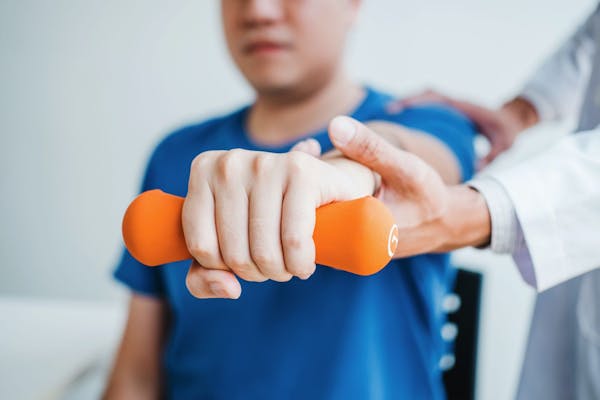Health Blog: Solutions & Wellness Tips
Hands-on movement by PT have a positive effect on tennis elbow

Lateral epicondylitis, often referred to as tennis elbow, is a painful condition that results from overuse. It occurs when the tendons that connect the muscles of the forearm to the outside of the elbow become damaged and inflamed, which leads to pain or a burning sensation in this region. Tennis elbow is-unsurprisingly-most common in tennis players, but can also affect other athletes and anyone who repeatedly performs movements that involve the elbow. Most patients with tennis elbow are treated conservatively (non-surgically) at first with various interventions that are often part of a treatment plan designed by a physical therapist. Although many of these interventions have been studied, most reviews focus on several of them being used at once, which makes it difficult to determine the effectiveness of each one individually. For example, the effectiveness of joint mobilization-a technique in which the therapist moves the elbow in a number of specific ways-has not yet been evaluated in a comprehensive manner. Therefore, a powerful pair of studies called a systematic review and meta-analysis was conducted to determine if joint mobilizations are effective for improving pain, grip strength and disability for patients with tennis elbow.
Three medical databases are searched for relevant studies
Researchers performed a search of three major medical databases for studies that investigated the use of any type of joint mobilizations being used to treat adult patients with tennis elbow. A total of 257 articles were originally identified and assessed to determine if they were eligible, of these 20 met the necessary criteria and were accepted into the study. Once these studies were identified, researchers analyzed their findings and compared them to one another with the goal of finding trends about joint mobilizations. The quality of each study was also assessed so that a consensus could be made as to how reliable their findings were.
High-quality evidence shows that two types of joint mobilization are beneficial
Overall, results were supportive of the effectiveness of joint mobilizations for tennis elbow. In particular, high-quality evidence was found that showed two types of joint mobilization-mobilization with movement (MWM) and Mill's manipulation-were more beneficial than comparison groups for improving pain in the short term and intermediate term. There was also strong evidence that MWM is more beneficial than no treatment at improving grip strength in the short term. MWM consists of a technique in which the therapist glides the forearm while securing the shoulder with the other hand, during which the patient simultaneously performs a pain-free gripping action. In Mill's manipulation, the therapist performs a maneuver that quickly stretches out the painful tissue from tennis elbow with a thrust mechanism. Based on these findings, researchers felt confident recommending either MWM or Mill's manipulation for a moderate-sized positive effect on pain and grip strength. Patients with symptoms that suggest tennis elbow may therefore want to consider seeing a physical therapist for their condition, since they can provide these types of mobilizations and other techniques that will help them improve in the fastest and safest manner possible.
-As reported in the April '18 issue of the Journal of Hand Therapy



